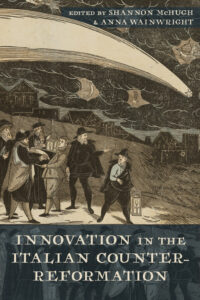
Shannon McHugh and Anna Wainwright
Hardback
September 2020 • ISBN 9781644531877 • $150.00
Paperback
September 2020 • ISBN 9781644531884 • $72.00
* E-Book Available
Order Online
Series
The Early Modern Exchange
The enduring “black legend” of the Italian Counter-Reformation, which has held sway in both scholarly and popular culture, maintains that the Council of Trent ushered in a cultural dark age in Italy, snuffing out the spectacular creative production of the Renaissance. As a result, the decades following Trent have been mostly overlooked in Italian literary studies, in particular. The thirteen essays of Innovation in the Italian Counter-Reformation present a radical reconsideration of literary production in post-Tridentine Italy. With particular attention to the much-maligned tradition of spiritual literature, the volume’s contributors weave literary analysis together with religion, theater, art, music, science, and gender to demonstrate that the literature of this period not only merits study but is positively innovative. Contributors include such renowned critics as Virginia Cox and Amedeo Quondam, two of the leading scholars on the Italian Counter-Reformation.
Shannon McHugh is Assistant Professor of Italian and French at the University of Massachusetts, Boston.
Anna Wainwright is Assistant Professor of Classics, Humanities, and Italian Studies at the University of New Hampshire.
